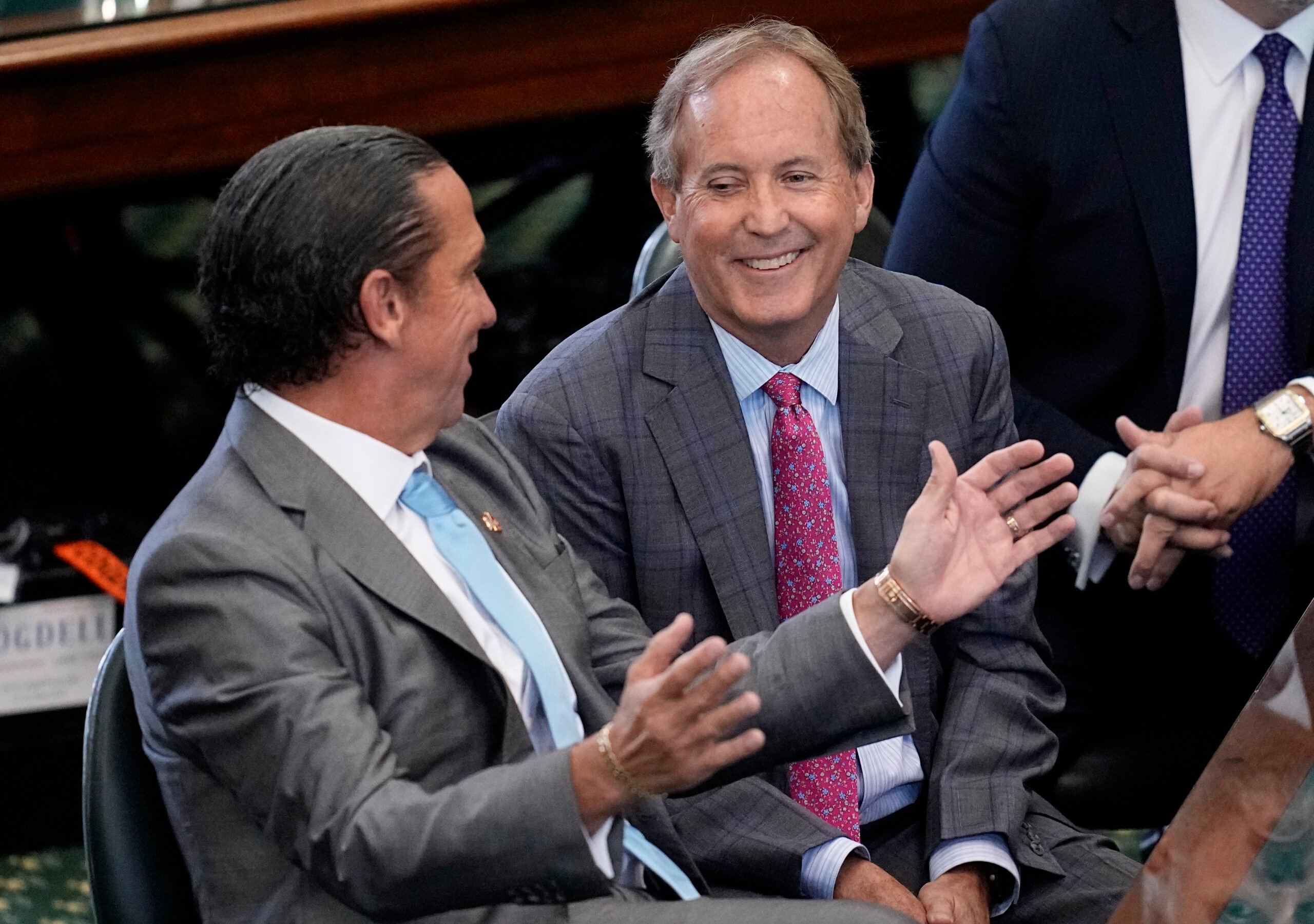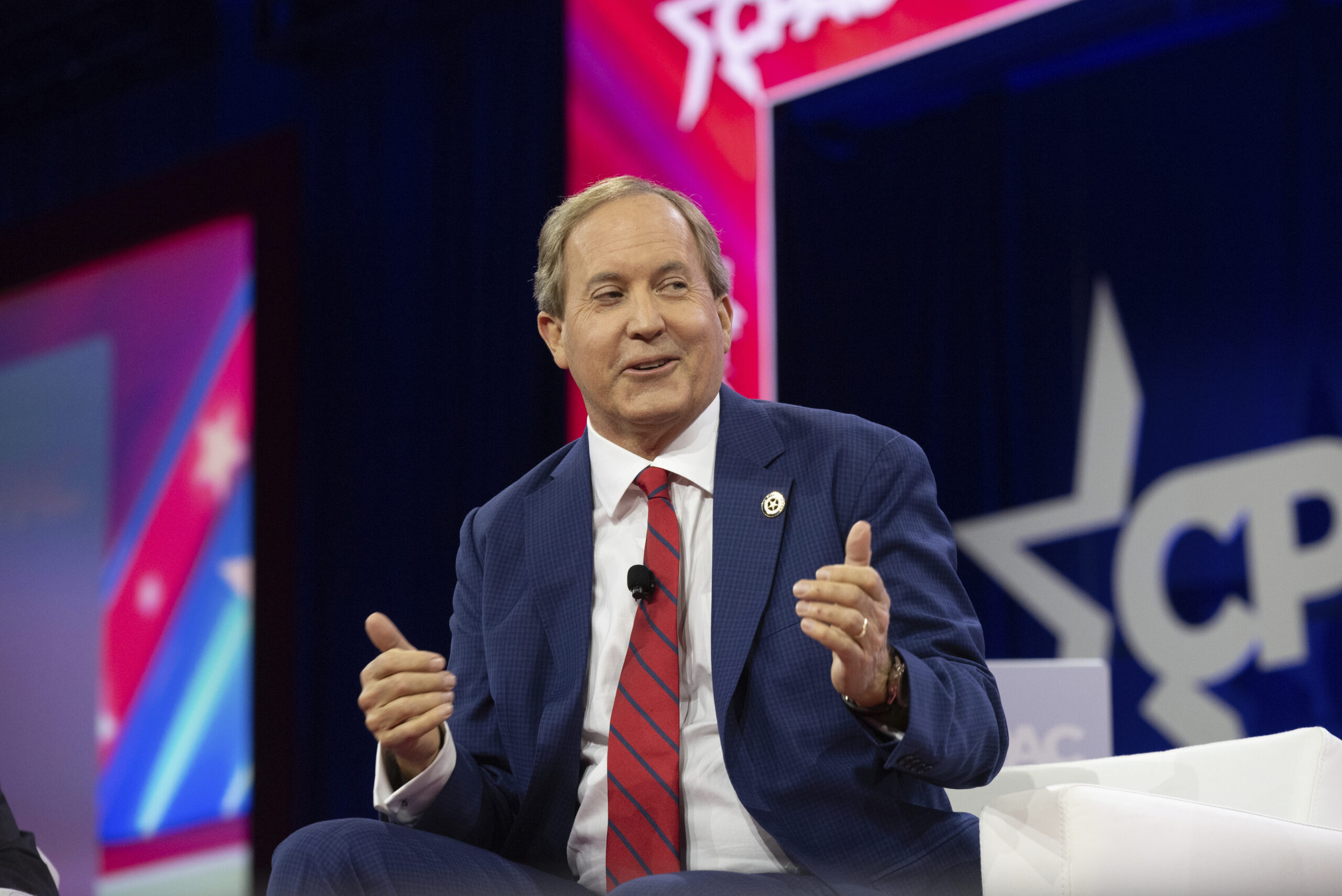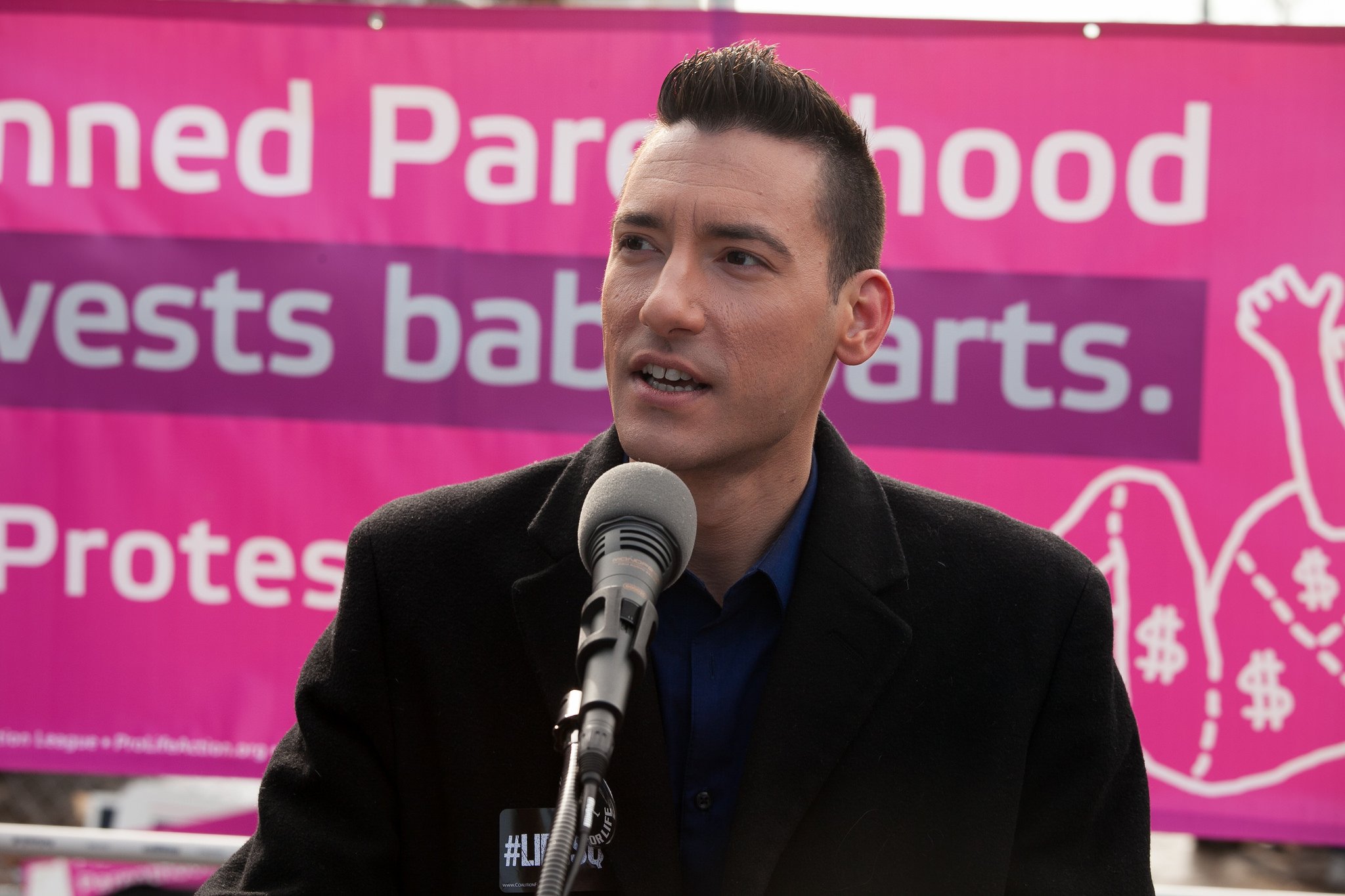Call him Kevlar Ken. Once again, Texas’ attorney general has proven to possess an impenetrable shield of impunity.
Last week, special prosecutors struck a deal to essentially let Ken Paxton off the hook for three felony securities fraud charges just before the nearly decade-old case was set to go to trial in Houston. The charges will get dropped in exchange for Paxton paying his alleged victims a little under $300,000, among other terms.
Thus came the shockingly abrupt end to a legal saga that has hung over Paxton for almost the entirety of his tenure as attorney general. The longer the case dragged on, the more it came to define Paxton—as a persecuted hero in the eyes of his supporters and a corrupt crook to his detractors.
Paxton was charged in 2015 with securities fraud for allegedly encouraging friends to buy stock in a McKinney technology firm without disclosing that he would be compensated by the company and for allegedly steering clients to a friend’s investment firm without registering as an investment advisor.
From the moment he was indicted by a grand jury in his home Collin County, Paxton claimed to be the innocent victim of a political persecution engineered by the Republican establishment that had opposed his bid for AG. His longtime defense lawyer, Dan Cogdell, who also played a starring role on Paxton’s successful impeachment defense team, has said the charges were always trumped-up “bullshit” only pursued because media-hungry special prosecutors wanted to take out the sitting AG. (The SEC also brought civil fraud charges against Paxton, but the suit was dismissed in 2017 by a federal judge.)
On top of his recent state Senate acquittal on House impeachment charges, which outlined alleged bribery and abuse of office, Paxton’s triumphant escape from his securities fraud trial further cements his status as Texas’ amazing political Houdini.
“There will never be a conviction in this case nor am I guilty,” Paxton declared in a triumphant statement last week.

For Paxton and allies now comes the time to clean house and exact vengeance—beginning with Republican House Speaker Dade Phelan, who was forced last month into a May runoff. With the AG now unshackled, Paxton and co. believe they can finally drain the Austin swamp, lay waste to the RINOs, and disband the so-called uniparty that has allowed Democrats to secretly control the Texas House (so secretly that Dems themselves would be shocked to learn they’ve held so much power).
Longtime Paxton defense lawyer Mitch Little has become one of the leading tribunes of Ken’s revenge campaign. After playing a major role in the impeachment defense, Little leveraged his newfound prominence into a run for a Texas House seat, ousting one of the GOP state reps who’d voted to impeach Paxton.
“This was the 21st Century’s magnum opus of lawfare. And, it ends today,” Little wrote on X when the securities fraud deal was approved. “Now, I want you to imagine what you would do once set free from this nightmare. That’s what’s coming. We are in the preamble of reform in the great State of Texas, and there will be a proper accounting.”
“This is the most unusual resolution of a major felony that I’ve ever seen,” Houston lawyer David Berg told Texas Monthly. “It must be good to be Ken Paxton.”
The repeated delays, many of which were caused by Paxton’s repeated challenges over the case’s venue and the high pay rates the government was paying for its star special prosecutors, were like a slow bleed. “Deferring justice for nine years is pretty much a fatal shot through the heart of an indictment,” Berg said.
Much like Paxton’s impeachment acquittal, the aftermath of the securities fraud deal has been animated by public sniping and beefs between Paxton’s lawyers and the special prosecutors—all of whom are big-time lawyers with egos.
The lead special prosecutor, Brian Wice, a well-known Houston defense lawyer, has taken heavy fire for ceding the case after having vigorously embraced the role of crusading prosecutor. But Wice insists this was not a prosecutorial surrender.
“Ultimately, this was a resolution that required [Paxton], whether inferentially or indirectly, to accept responsibility,” he told reporters. “I’m not going to concern myself an iota as to who wins. … So the question isn’t … who won, but was justice served? And I think the answer was unmistakably, ‘Yes.’”
“This is not really what people think of when they hear securities fraud.”
That was a clear about-face from Wice compared to just weeks earlier, when he scuttled a potential deal offered by his co-special prosecutor, which he said would’ve been “worse than a slap on the wrist. That was, ‘Gee, let’s get you a cocktail, a hot meal and a breath mint.’ And that wasn’t going to happen on my watch,” Wice said.
His fellow prosecutor, Kent Schaffer, a Houston criminal lawyer with hefty trial experience, had negotiated that prior deal and resigned when it was killed.
“Without sounding too mercenary, there came a time that it dawned on me that I’m not the one who should be financing the prosecution of Ken Paxton,” Schaffer told the Houston Chronicle. “I’ll do pro bono cases for widows, orphans, poor people being taken advantage of by the system. But I’m not going to go after some politician and spend tons of money to punish him. That’s not my job.”
Pending legal challenges have prevented either prosecutor from receiving a dime for their services so far.
Wice, an accomplished appellate lawyer with little experience in criminal trials, then had to scramble to find a replacement for Schaffer, who’d handled the pretrial casework and would’ve led the prosecution at trial.
After reviewing the facts of the case and reinterviewing witnesses for the first time in years, Wice seemingly lost faith in the strength of the case. Many of the witnesses were reportedly hostile to the prosecutors and remained protective of Paxton. Wice was willing to settle once Paxton’s team confirmed the AG would be willing to pay restitution to his alleged victims.
For all the emphasis placed on the serious nature of Paxton’s securities fraud felony charges and the maximum penalty they carried—99 years in prison—it was never likely that Paxton would’ve been locked up for any amount of time if he’d been convicted. White-collar crimes of this scale generally result in probation or a pretrial deal like the one Paxton got.
“This is not really what people think of when they hear securities fraud,” one law professor told the Texas Tribune. “This is not Bernie Madoff or Sam Bankman-Fried.”
Wice himself recently told WFAA: “I never envisioned any scenario, any universe in which, by which, through which, that a judge or jury would put Ken Paxton in prison” based on the securities charges.
For all the allegations of corruption, rule-breaking, and ethics violations, nothing has stuck to Paxton. Other criminal probes opened into Paxton’s allegedly corrupt land deals in Collin County when he was a state representative, along with bribery allegations for a six-figure gift Paxton took for his legal defense fund from the target of a Medicaid fraud investigation involving the AG’s office, came up empty.

Of course, Paxton’s legal troubles are far from over—but there’s reason to believe these could end in similar fashion.
Paxton still faces a civil whistleblower lawsuit from his former top deputies, which he has tried to unilaterally end by agreeing not to contest the facts or judgment (much to the chagrin of at least one senator who’d just acquitted him on charges based on those same facts) in an apparent attempt to avoid deposition and trial. Then, there’s an FBI investigation into Paxton’s relationship with Austin real estate mogul Nate Paul (who himself faces federal charges of bank fraud), which was prompted by the same whistleblowers back in 2020. This federal investigation has been open for well over three years, and there are scant details about its status.
In addition to paying nearly $300,000 in restitution to the investors he allegedly defrauded, Paxton must now complete 100 hours of community service and take 15 hours of legal ethics courses.
Paxton could knock 45 minutes off his mandatory remedial legal ethics education with a course called “Hard Knocks in Little Rock,” in which former Arkansas Attorney General Steve Clark shares his scared-straight story of public corruption: Clark was forced to resign in 1990 after his felony theft conviction for abusing a state expense account to reimburse himself for fake dinners.
“Steven Clark was at the top of his career as a state Attorney General when an ethics scandal changed everything,” the course description reads. “Learn how his fall from grace led to powerful insights about the importance of ethics in an attorney’s daily life.”
Though, Paxton is perhaps more likely to teach a course of his own about how to avoid such a fall. His lesson: Never resign, never surrender, and never forget.




